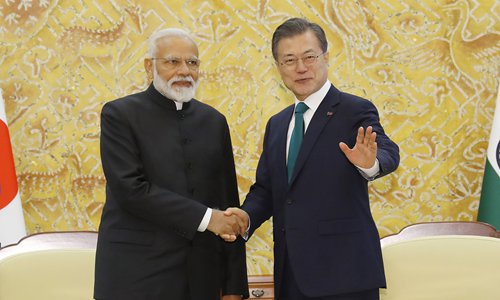HOME >> OPINION
China should remain alert to India-South Korea security cooperation
By Ma Weiying Source:Global Times Published: 2019/9/24 20:48:40

Indian Prime Minister Narendra Modi and South Korea's President Moon Jae-in shake hands in Seoul, South Korea in February, 2019. Photo: VCG
South Korea-India relations have improved ever since South Korean President Moon Jae-in was sworn into office in 2017. Progress has been made in areas of defense and security cooperation. The two countries have signed multiple defense cooperation agreements, worked together on weapons manufacturing and export, and conducted joint military exercises.
This Seoul-New Delhi defense cooperation has moved forward as a result of their national strategies and external factors.
The Indian Ocean is South Korea's energy import route from the Middle East. To ensure transport security, Seoul must enhance joint escort operations with India.
The Moon administration has also attached importance to national autonomy and diplomatic diversification. It has emphasized the importance of strengthening ties with Southeast Asian countries and India. Declining relations with Japan have increased Seoul's outward expansion efforts to create more room for security cooperation.
Since Moon took office, he has spared no efforts in promoting his New Southern Policy, viewing India as not only an emerging economic market but also a significant destination of arms export.
For India, such cooperation with South Korea is a vital component of its Act East Policy. Indian Prime Minister Narendra Modi turned the Look East Policy into the Act East Policy, making South Korea a pivot within its Northeast Asia strategy.
Modi's Act East Policy looks beyond establishing cooperation with rising economies in the Asia-Pacific region and has geopolitical intentions. Due to its economic development, India has stepped up its efforts to realize the dream of becoming a major global power and perceived China's rise as a threat.
Two strategic considerations define India's security cooperation with South Korea. First, New Delhi hopes to get more involved in Northeast Asian issues while expanding regional influence. Developing all-round cooperation with South Korea is conducive to India's involvement in Northeast Asia. Second, New Delhi wants to seek Seoul's cooperation in addressing the "China threat."
How far can Seoul-New Delhi security cooperation progress? To some extent this is influenced by Seoul-Tokyo and Seoul-Beijing ties.
Japan is also a critical partner of India. They are both part of the US Indo-Pacific Strategy. Both countries are close not only in the economic domain, but also in security and defense. Compared with South Korea, Japan shares broader strategic common ground with India.
As Japan-South Korea conflicts intensify, India has to balance its relationship with both countries. In arms trading, joint military exercises, and space development plans, cooperation with one party may hedge strategic interests of the other. Therefore, India's defense cooperation with Seoul suffers constraints from Japan-South Korea ties.
Although there have been differences between China and South Korea due to the Terminal High Altitude Area Defense (THAAD) issue, it is believed that Seoul does not wish to contain or confront China. This attitude has been revealed by Moon's diplomatic choices as his administration hasn't taken sides on the South China Sea issue. Besides, it so far has maintained a vague attitude toward the US Indo-Pacific Strategy.
These decisions reveal that South Korea values its economic cooperation with China. Amid the economic downturn, cooperation with China can help boost the South Korean economy. Also, both countries demonstrated benign intentions on the North Korean issue. So, Seoul-New Delhi defense cooperation is not likely to emerge as a strategy for containing China. Cooperation with India is only a manifestation of South Korea's pluralistic diplomacy, and the latter's appeal is centered more on economic interests.
Nonetheless, China must remain vigilant. India has tried to win over Southeast Asian countries and move toward a multilateral defense. It recently conducted joint maritime exercises with Singapore and Thailand. Incorporating South Korea into this mechanism is a potential threat to China's peripheral security.
Meanwhile, as a significant player in the US Indo-Pacific Strategy, India could garner US support by cooperating with South Korea. Beijing must be wary of the possibilities of Washington and New Delhi wooing Seoul to join the Indo-Pacific Strategy.
The author is an assistant research fellow with the Center of Northeast Asian Studies at the Jilin Academy of Social Sciences. opinion@globaltimes.com.cn
Posted in: VIEWPOINT